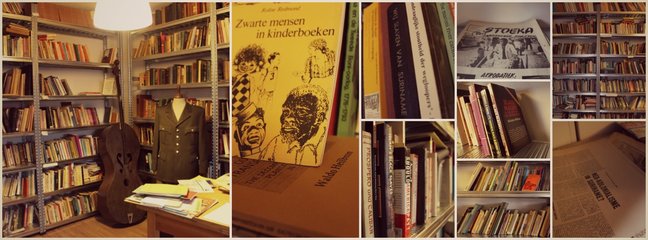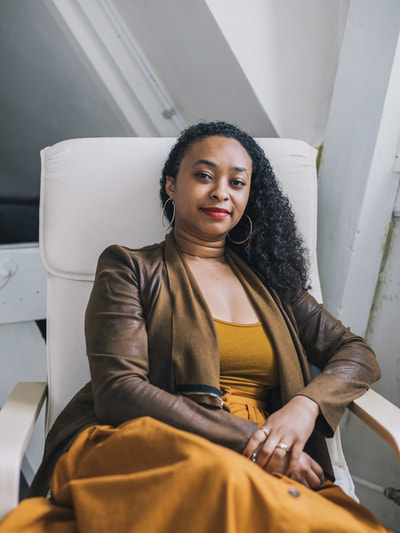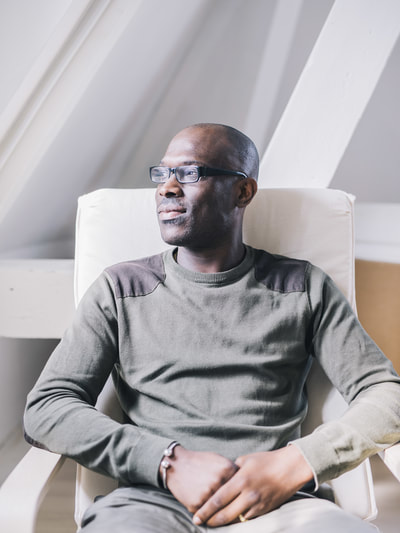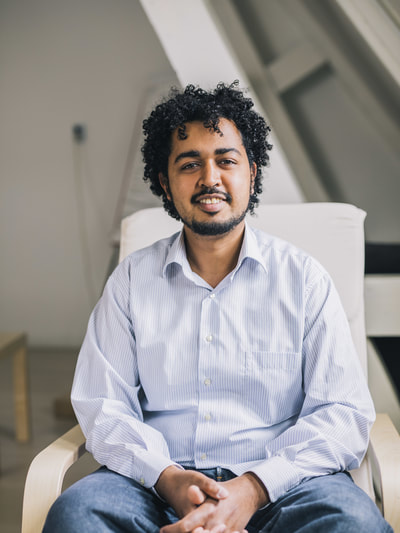About The Black Archives
The Black Archives is a unique historical archive for inspiring conversations, activities and literature from Black and other perspectives that are often overlooked elsewhere. The Black Archives documents the history of black emancipation movements and individuals in the Netherlands. The Black Archives is managed by the New Urban Collective.
The Black Archives consists of unique book collections, archives and artifacts that are the legacy of Black Dutch writers and scientists. The more than 10.000 books in the collections focus on racism and race issues, slavery and (the) colonization, gender and feminism, social sciences and development, Suriname, the Netherlands Antilles, South America, Africa and more.
As a result, The Black Archives provides book collections and literature which are not or little discussed in schools and within universities. The collections are intended as a start collection that can grow by gifts and collaborations with others. In this way, Black literature, knowledge and information is made accessible for study and research.
Based on the collections we develop exhibitions, public programmes and other educational and inspirational activities.
The Black Archives contains the following books collections and archives
The Black Archives consists of unique book collections, archives and artifacts that are the legacy of Black Dutch writers and scientists. The more than 10.000 books in the collections focus on racism and race issues, slavery and (the) colonization, gender and feminism, social sciences and development, Suriname, the Netherlands Antilles, South America, Africa and more.
As a result, The Black Archives provides book collections and literature which are not or little discussed in schools and within universities. The collections are intended as a start collection that can grow by gifts and collaborations with others. In this way, Black literature, knowledge and information is made accessible for study and research.
Based on the collections we develop exhibitions, public programmes and other educational and inspirational activities.
The Black Archives contains the following books collections and archives
- Heilbron Collection
- Huiswoud Collection
- Willemsen Collection
- Archives and books collection of Association Ons Suriname
Founders
The initiators of The Black Archives: Jessica de Abreu, Mitchell Esajas, Miguel Heilbron and Thiemo Heilbron
Photo's by Marcel Wogram (De Abreu, Esajas en M. Heilbron) en Liliane Smith (T. Heilbron)
Photo's by Marcel Wogram (De Abreu, Esajas en M. Heilbron) en Liliane Smith (T. Heilbron)
In June 2015 the “New Urban Café” was opened, an inspiring place where people could get together to learn about the culture, history and literature from and about the Surinamese and African Diaspora. Almost 2.000 books, collected by the late sociologist Waldo Heilbron, were made available here. Waldo Heilbron was a sociologist at the University of Amsterdam who studied post-colonialism, the Trans-Atlantic slave trade and its legacy, racism and historiography.
In his book 'The Future of the Past: Reflections on Dutch History of Slavery and its Legacy ' (2006) Heilbron wrote:
"The trans-Atlantic slave trade and slavery left deep traces; in society and in the individual lives of many who are heirs of this history. In the public debate about the Dutch history of slavery, that rose at the end of the last century, it is this part of the history that is largely 'silenced past '. A lot of what is concealed is forgotten. (...) In deepening the knowledge about us ' concealed past ', new ways of thinking and research are needed. "
It was Heilbron's mission to develop new perspectives within the historiography and social sciences by contributing to alternative methodologies and critical perspectives. Since June 2015, the collection has grown by several donations of books, literature and film material, and more than 1000 visitors attended our activities.
Since 2016, The Black Archives is located at a new location at Verenging Ons Suriname, which added several collections such as the Huiswouds collection, Willemsen Collection and book collections and archives of Verenging Ons Suriname.
In his book 'The Future of the Past: Reflections on Dutch History of Slavery and its Legacy ' (2006) Heilbron wrote:
"The trans-Atlantic slave trade and slavery left deep traces; in society and in the individual lives of many who are heirs of this history. In the public debate about the Dutch history of slavery, that rose at the end of the last century, it is this part of the history that is largely 'silenced past '. A lot of what is concealed is forgotten. (...) In deepening the knowledge about us ' concealed past ', new ways of thinking and research are needed. "
It was Heilbron's mission to develop new perspectives within the historiography and social sciences by contributing to alternative methodologies and critical perspectives. Since June 2015, the collection has grown by several donations of books, literature and film material, and more than 1000 visitors attended our activities.
Since 2016, The Black Archives is located at a new location at Verenging Ons Suriname, which added several collections such as the Huiswouds collection, Willemsen Collection and book collections and archives of Verenging Ons Suriname.
The team
The Black Archives works together with a team to keep it an inspiring space. In addition to many volunteers, there is a team that build, maintain, advice and does community work with in the Black Archives: Aldaïr, Odile, Camille Parker and Levison.
About the organisation: New Urban Collective
New Urban Collective manages The Black Archives: the archives and bookcollections, en coördinate the activities.
New Urban Collective is a network initiated by students, young people and young professionals with a heart for the multicultural society. The Foundation has the mission to strengthen the socio-economic position of students, young people and young professionals of various cultural backgrounds, with special attention to the Afro-Caribbean Community and the African Diaspora: on the one hand, to strengthen the self-awareness and, on the other hand, the personal development. We organize activities, projects and advise organisations and individuals in the fields of education, labour market, diversity and human rights.
“It Takes A Village to Raise A Child”
The West African proverb: 'it takes a village to raise a child' also applies to the Dutch society. A strong network can help young people in their personal development and social mobility. N.U.C. aims to create a network in which young people can come into contact with inspiring individuals from different facets of society. Within this network knowledge transfer and culture are central, so that young people are encouraged and motivated to make full use of their potential.
The vision of the New Urban Collective is:
1. The 'New' : N.U.C. believes that every person can becomes a 'new' person through life as every day we can learn something new. By constantly developing ourselves, we grow and we can make any day a step closer to the realization of our goals. Therefore N.U.C. has a strong emphasis on the value of knowledge, education and self awareness. Knowledge and education open doors in society and self awareness allows us to take responsibility over our own lives. By stimulating one intellectually and show (social) efforts , N.U.C. aims a pool of successful bicultural people of the future.
2. The 'Urban' : the term urban refers to the life of the big city, this life is characterized by the complexity of diversity. N.U.C. recognizes differences between people because differences make us unique, but also recognizes the basic underlying agreement, our humanity. N.U.C. believes in a society in which there is room for differences and openness to cultural diversity.
3. The 'Collective' : the West-African proverb, 'it takes a village to raise a child' also applies to Dutch society. A strong network can help people in their personal development and social mobility. N.U.C. aims to create a network in which everyone comes into contact with inspiring individuals from different facets of society. Within this network knowledge transfer and culture are central, so that one is encouraged and motivated to make full use of their potential.
Our objectives are:
1. the promotion of education and strong labour market position of Afro-Dutch people
2. Supporting the self-awareness of our members to encourage them to make full use of their talent and potency
3. Promoting the professional knowledge and skills of our members
4. The provision of services on educational, social and economic area for our members
5. Maintaining and strengthening the ties between members and between members and the Dutch society
6. Maintaining a network in the interests of our members
New Urban Collective is a network initiated by students, young people and young professionals with a heart for the multicultural society. The Foundation has the mission to strengthen the socio-economic position of students, young people and young professionals of various cultural backgrounds, with special attention to the Afro-Caribbean Community and the African Diaspora: on the one hand, to strengthen the self-awareness and, on the other hand, the personal development. We organize activities, projects and advise organisations and individuals in the fields of education, labour market, diversity and human rights.
“It Takes A Village to Raise A Child”
The West African proverb: 'it takes a village to raise a child' also applies to the Dutch society. A strong network can help young people in their personal development and social mobility. N.U.C. aims to create a network in which young people can come into contact with inspiring individuals from different facets of society. Within this network knowledge transfer and culture are central, so that young people are encouraged and motivated to make full use of their potential.
The vision of the New Urban Collective is:
1. The 'New' : N.U.C. believes that every person can becomes a 'new' person through life as every day we can learn something new. By constantly developing ourselves, we grow and we can make any day a step closer to the realization of our goals. Therefore N.U.C. has a strong emphasis on the value of knowledge, education and self awareness. Knowledge and education open doors in society and self awareness allows us to take responsibility over our own lives. By stimulating one intellectually and show (social) efforts , N.U.C. aims a pool of successful bicultural people of the future.
2. The 'Urban' : the term urban refers to the life of the big city, this life is characterized by the complexity of diversity. N.U.C. recognizes differences between people because differences make us unique, but also recognizes the basic underlying agreement, our humanity. N.U.C. believes in a society in which there is room for differences and openness to cultural diversity.
3. The 'Collective' : the West-African proverb, 'it takes a village to raise a child' also applies to Dutch society. A strong network can help people in their personal development and social mobility. N.U.C. aims to create a network in which everyone comes into contact with inspiring individuals from different facets of society. Within this network knowledge transfer and culture are central, so that one is encouraged and motivated to make full use of their potential.
Our objectives are:
1. the promotion of education and strong labour market position of Afro-Dutch people
2. Supporting the self-awareness of our members to encourage them to make full use of their talent and potency
3. Promoting the professional knowledge and skills of our members
4. The provision of services on educational, social and economic area for our members
5. Maintaining and strengthening the ties between members and between members and the Dutch society
6. Maintaining a network in the interests of our members
Openingstijden/Opening TimesWoensdag/Wednesday 11.00 - 17.00 uur
Donderdag/Thursday 11.00 - 17.00 uur Vrijdag/Friday 11.00 - 17.00 uur Zaterdag/Saturday 11.00 - 17.00 uur Onze nieuwe locatie in Amsterdam Zuidoost is geopend. Neem contact op via de pagina contact voor rondleidingen buiten het programma. We moved to South East Amsterdam. Contact us via the page contact for tours outside our program. |
(Rolstoel)toegankelijkheid/Accessibility
Momenteel beschikt The Black Archives niet over een speciale ingang en lift voor personen met een fysieke beperking en voor rolstoelgebruikers.
At this moment, The Black Archives does not have a special entrance or lift for person of disability. |






